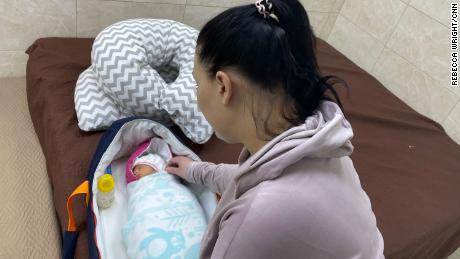BioTexCom Human Reproduction Center in Kyiv It was moved to the concrete basement on the first day of Russian invasion Almost three weeks ago, to protect children from any incoming fire.
But it is located a little over nine miles away From Irvine, a suburb that has been the target of a Russian attack, it is still far from safe – making it difficult for new parents, who are in countries like Canada, Italy and China, to collect children.
On Monday morning, a 30-year-old surrogate arrived at the makeshift clinic with the baby she had delivered at the hospital a week earlier. She was unable to hold back her tears as she handed Baby Lawrence to the staff.
“It’s tougher to be in a place where there’s bombing,” said the surrogate, who only wanted to use her first name, Victoria. “And when are his parents going to take him away because of that? It’s really tough.”
Victoria was transported from the maternity hospital to the surrogacy center in a van by a staff member. She said the employee drove nearly 100 miles per hour across town in an effort to reduce the chance of being hit by missiles. When Victoria entered the building while cuddling the child, she said she heard the sound of Ukrainian anti-aircraft fire from afar.
Once inside the vault, there was Three louder explosions, one of which shot down an incoming Russian cruise missile less than a mile away. Surveillance footage posted on social media shows a man walking down the nearby street when the intercepted missile hit. No one is believed to have died in the blast.

‘They’ve waited 20 years for their baby’
Baby Laurence’s biological parents, who provided both sperm and an egg for pregnancy, live abroad. But it is unclear when they will be able to collect their son.
“They say they’re coming,” Victoria said. “(But) the paperwork is very hard to deal with at the moment. How long (it’s going to take), nobody can tell.”
Victoria added that she kept Lawrence’s parents informed “until the last minute” before handing the baby over to surrogacy. “And we hope to keep in touch, because (the situation) is very difficult.”
Many countries around the world have strict rules about the practice of surrogacy, and some couples struggle to have a baby naturally switched to ukraine In recent years, as commercial surrogacy is not banned, and its clinics offer competitive rates compared to other countries.
Ihor Pechinuga, the doctor who helps run the surrogacy center, said the women are paid between $17,500 and $25,000 for being a replacement.
Victoria wanted to put the money into a deposit for a home for her family, which she had struggled to provide since giving birth to her daughter at age 17. She said her now 13-year-old daughter left Ukraine for Bulgaria when the war began.
But after being hospitalized for most of her pregnancy with Lawrence for pregnancy complications – and facing what she describes as the trauma of abandoning the baby she now feels attached to – Victoria said she would never do it again.
BioTexCom has temporarily halted the program due to the war, and has focused on supporting women who are currently pregnant, and safely getting newborns out of the country. While the clinic can try to move children to safer areas of western Ukraine, new parents still have to take children into the country for legal reasons – and some are afraid to cross the border.

“It all depends on the strength of the parents’ desire,” said the 51-year-old Pechinoga. “I met the parents who came to Kyiv to take their child; tears were in their eyes. They had waited 20 years for their child, (so) of course they came no matter what.”
But there are also “husbands who are afraid, because there is a war going on here, and a dangerous war,” he said.
Six nannies work in the clinic to feed and care for 21 children. They are becoming increasingly concerned about the progress of the conflict, as bombs fall near the building. A nanny, Antonina Yefimovich, 37, said that children can feel fear and anxiety in the room.
But the nannies refused opportunities to leave Kyiv, because they did not want to give up the children.
“I’m going (because) I have my family too,” Yefimovich said. “But we don’t have anyone to leave these children with.”

Yefimovich’s mother, husband, and two daughters have already fled town and are now more than 120 miles away. far.
“Of course I’m worried about them,” she said. “But I feel better because at least my mother and husband are there. They will take care of the children.”
These children “cannot be abandoned,” she said. “They are defenseless. They also need care. We really hope the parents come to pick them up soon.”

